#irminsul
Text



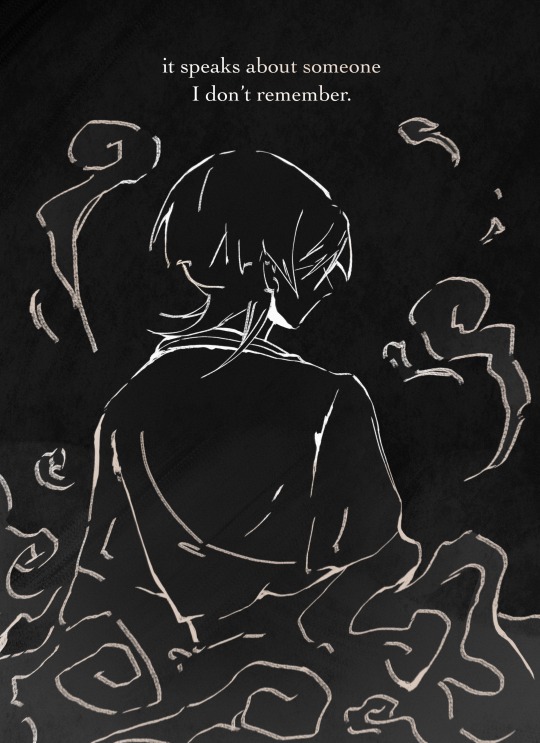
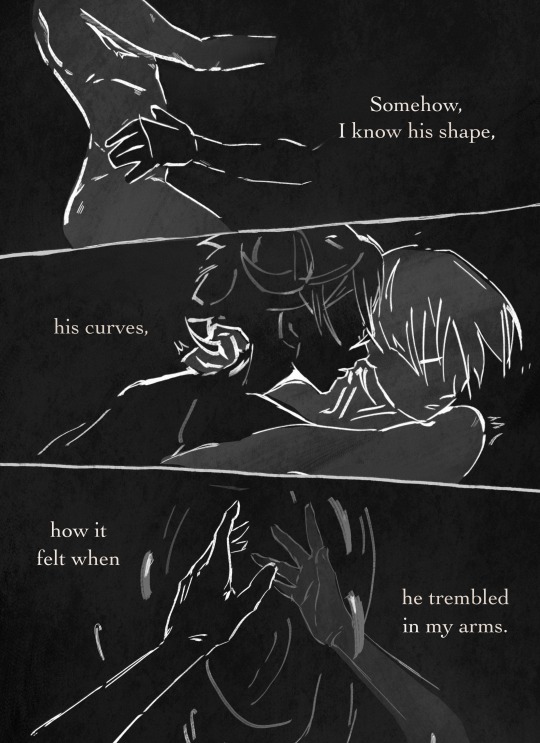
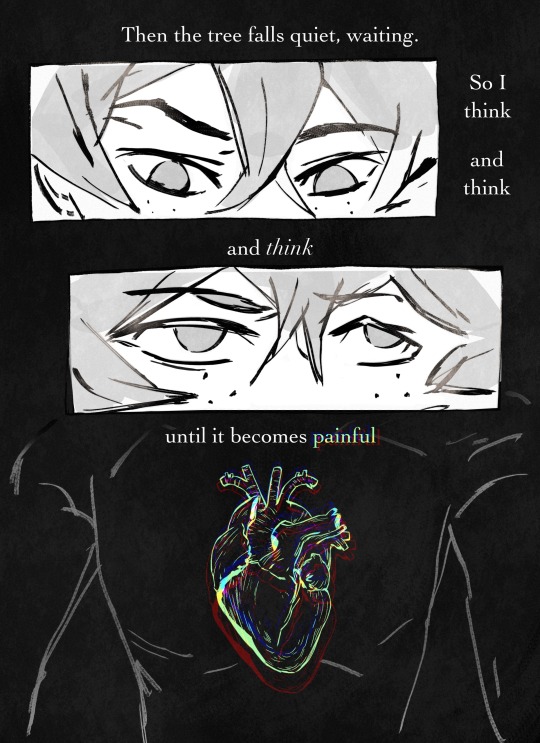


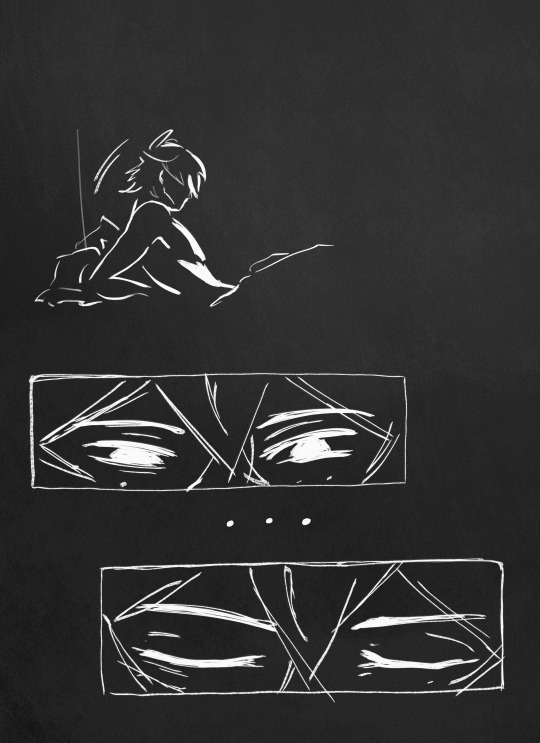

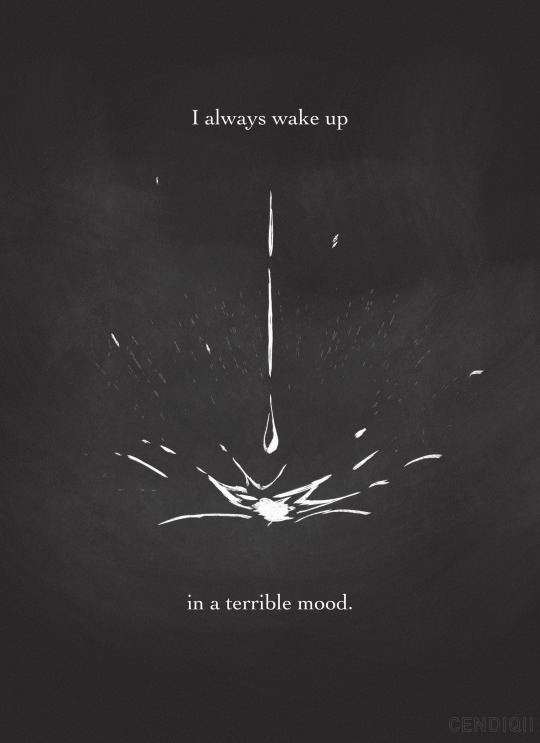
Phantom pain
(Reference to 4.0 Archon Quest)
#chiscara#scarachilde#childe#tartaglia#scaramouche#wanderer genshin#kunikuzushi#kabukimono#genshin impact#genshin fanart#genshin art#art#myart#fanart#childe tartagalia#irminsul#comic#webcomicc#webtoon#genshin comic#genshin impact fanart#rkgk#rkgkillust#illust#illustration#illustrator#illustrators on tumblr#drawing#artwork#artists on tumblr
2K notes
·
View notes
Text
Its confirmed!!
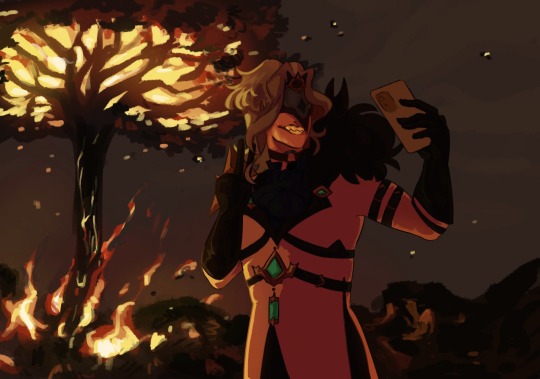
#genshin impact#genshin fanart#dottore#fanart#irminsul#il dottore#dottore burning irminsul canon#i love him#let him burn the world#genshin
360 notes
·
View notes
Text
Love, Lost and Wandered࿐ ࿔*:・゚
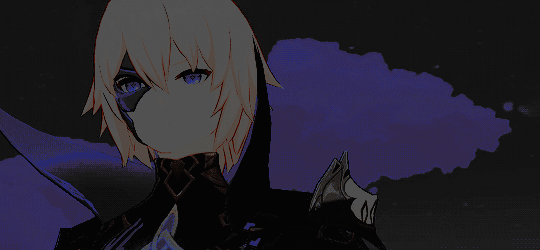
dainleif is scared of forgetting you, he would traverse the cursed plains of the irminsul to remember you. — cursed grounds that belonged to one of those damned archons just to remember you. his curse now includes you as well. im gonna be honest and tell you straight up idk how the irminsul or dainsleif work and whether or not this is accurate to their lore, i just want to write a devoted lover dain who’s willing to beg to the archons for reader like that one questline. also!! reblogs and follows are very appreciated as it lets me know you guys enjoy my writing!! . (reader x dainsleif) oct. 15 2023 part one (?)
dainsleif is too ashamed to admit this aloud but he finds himself forgetting you. who once was his most precious, his beloved; your voice, your laugh, even your smile. — the gods are merciless but were ‘kind’ enough to spare you from turning you into the hilichurls doomed to wander the earth, loyal only to their most primal instincts. they were ‘kind’ enough to spare you from the curse of immortality, the pain of living and unable to die. he wonders which fate would have been better for the both of you, but he does believe death has been the most merciful outcome.
the only thing he has of you is the memory of your name, the love he can’t forget, and the dreams you’ve left with him. — but they’re not immune to the weathering of time. he finds himself slipping, forgetting the little things that complete your image, the treasures he salvaged from the remnants of his home broken down with the centuries that came with immortality and the dreams you held with him now seem blurry as though he couldn’t fathom to sleep and dream without you. it’s been eons and yet he still hasn’t gotten used to your absence beside him.
when fate is kind enough to grant him the time to paint, his mind goes over to the idea of you and he seems to get the gist of your frame, your figure but your face only seems to be drawn as a mixture of swirls, indescribable and indistinguishable from the fog that surrounds the memory of you.
as much as he hated to admit it, he was slowly forgetting you.
but he’s not ready yet, to forget you is to let you die once and for all. he’s the only one who holds the memory of you and if he forgets, you’re gone forever. — amidst the false gods, their endless pride and the heavens; you were the angel that almost made dainsleif believe in divinity.
he’s desperate to maintain that memory of you, to keep you alive and beside him to the best of his ability for forgetting you might doom to an eternity of restless living cursed only for vengeance.
dainsleif was desperate enough to keep that memory of you that he was willing to trek onto the irminsul, the ‘sacred’ grounds of the dendro archon that records say remembers everything. the memories stored within the ley lines that have touched all of teyvat, the ley lines that rooted itself deep beneath the grounds; roots that listened to every drop of rain, whisper and wind. — he was willing to traverse and resort to the divinities he loathed just to remember you. whether it’s be by force, or if he had to kneel, beg and grovel at the archon’s feet just to be welcomed into the dreamlike plains; he would do it for his pride was nothing next to his devotion for you.
the only obstacle now was whether or not the archon, buer was willing to let a khaenri'ahn survivor step foot into the holy grounds. — or if he could even ask for help from the traveler..
#meguminne#genshin x reader#genshin angst#genshin impact#dainsleif#dainsleif x reader#dainsleif x you#dainsleif angst#genshin fluff#khaenri'ah#genshin fanfic#just a little drabble#not lore accurate#i love dainsleif#dains x reader#genshin impact x reader#irminsul#devoted lover#dead reader
200 notes
·
View notes
Text

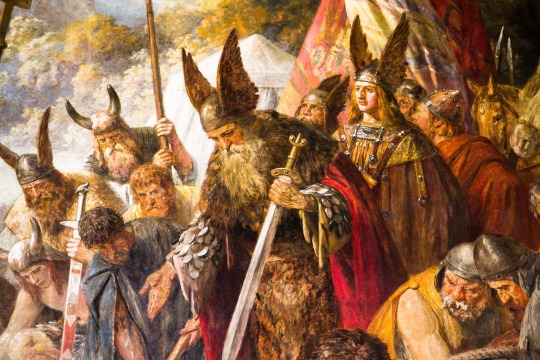
Charlemagne destroys the Irminsul (details) by Hermann Wislicenus
#hermann wislicenus#art#charlemagne#emperor#irminsul#franks#saxons#frankish#saxon#history#medieval#middle ages#germanic#knights#europe#european#mural#saxon wars#tree#pillar#sacred trees#sacred groves#paganism#christian#christianity#pagan#germany#imperial palace of goslar#holy roman empire#holy roman emperor
84 notes
·
View notes
Text

let the world forget me
98 notes
·
View notes
Text
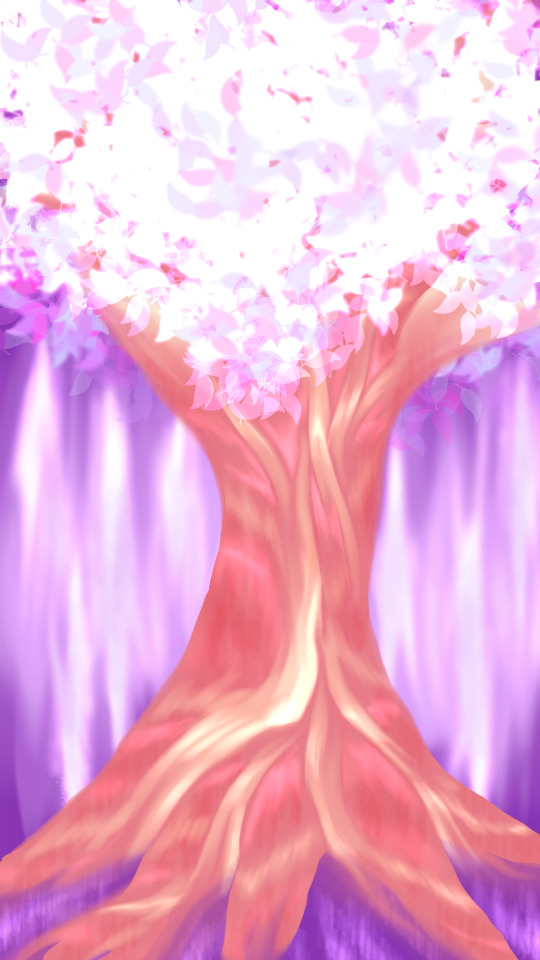
Irminsul // the imaginary tree
#art#bluemoon.txt#art shtuff#fandom shtuff#genshin impact#honkai 3rd#honkai impact#irminsul#the imaginary tree#i made this as a phone background but it’s way too light. if you wanna use it go ahead<3
619 notes
·
View notes
Text

Genshin theory time
OK hear me out. I’m posting a theory for the first time, and yet at the same time I want people to tell me I’m wrong about all of this. Concerns Irminsul, Dottore, Nahida and Wanderer.
SPOILERS!!! for something that was said in an interview with one of Genshin’s writers. If you don’t want to know, stop reading.
OK so. Apparently, Dottore burning Irminsul in the Lazzo trailer wasn’t just symbolic, but something that’s still going to happen in the future. First of all, this concerns me because Irminsul just being sick caused Eleazar and the Withering in Sumeru, and it’s also tied to Nahida – what will it do to her??
But then, always having Wanderer on the brain as I do, my thoughts wandered further, aided by this twitter post. If he’s really carved from a white tree, and he’s still self-sacrificing and trying to be ‘of use’, would he not try to replace Irminsul somehow if Dottore burns it down?
Killing Irminsul might remove all the ‘lies’ from Teyvat, unveiling history as it truly was. And having Wanderer and all his honesty as the new tree, he’d keep and preserve those truths. It’d be a way to stop and perhaps harm or kill Dottore, and ‘tell’ everyone everything about his true past in one fell swoop.
“There’s no such thing as pure freedom in this world. Even the wind cannot blow on forever.”
He’d be like an Aranara, sacrificing himself to become a protective, preserving tree. He’d perhaps still be able to project himself into dreams, connecting to Nahida and perhaps others he cares about, maybe create manifestations the way he did in Pardis Dhyai.
'Perhaps a day will come when this body's adventures, its experiences,
Will become tales to be passed along by mortals, distant memories that flow through the ley lines.
But for now, his third act is still ongoing.'
(Calabash of Awakening description.)
He’d also be connected to Teyvat’s memories, and in a way, be with everyone he’s lost as well...
This could also tie into him being a Vahumana scholar now, studying history and the humanities, perhaps priming himself to become the ultimate record-keeper and caretaker the same way Neuvillette primed himself to become Fontaine’s ruler.
I don’t know if this theory makes me really sad or strangely fulfilled. It makes narrative sense to me, and yet I don’t want it to happen. I want him to have a life, not continue his transactional thinking to the extreme, and yet, and yet...
...Also, the whole thing with Raidens planting important mystical trees.
Please tell me what you think :P
#genshin impact#wanderer#nahida#genshin#genshin wanderer#scaramouche#genshin scaramouche#genshin nahida#irminsul#genshin theory#genshin theories
32 notes
·
View notes
Text
[3.5 analysis] The Uncanny, Fate, and the Machine

In Genshin Impact, machines and automatons matter. They are everywhere in the world, from small devices and gadgets to hulking, imposing mountains of metal created for the purpose of war. I wanted to know what happens when we look at these machines through the lens of the uncanny in hopes of better understanding their narrative purpose. It turns out, machines tell us a lot about the plot's direction, from smaller stories like Karkata, Benben, and Tamimi’s relationship to humans, to the larger story of the twins landing in this strange world. This theory will deal with the larger story by applying the uncanny to the Akasha, Irminsul, and the Loom of Fate.
SPOILERS: Caribert (and all Sumeru Archon Quests preceding it, basically), Inversion of Genesis, Aranyaka (Aranara world quest), Alhaitham’s Story Quest (like two screenshots), two of Faruzan’s hangout endings, and one out of context screenshot from 3.5’s Windblume.
DISCLAIMER:
A part 0 to this can be found here, which was produced along the way to writing this theory. It is not absolutely necessary to understand the points in this post, but might be of interest if you liked the psychoanalysis bits and want to take a closer look at the meaning and significance of dreams.
All external sources will be listed at the bottom! If digital, they are linked. If print, the title and author are given.
The Uncanny 101
To be clear, this theory won’t be overly reliant on the psychoanalytic perspective of the uncanny, but I think Freud is a good place to start in order to get to where we need to go. If you’ll indulge me for a moment…
In his essay Das Unheimliche (1919) [The Uncanny], Freud proposes the psychoanalytic significance of the uncanny by first examining its linguistic meaning and then by applying it to literature. In order to fully understand the uncanny (unheimlich), Freud argues that we must first understand heimlich. We will follow suit. Heimlich has two common meanings, and we will start with its first meaning.
Heimlich’s most common meaning denotes familiarity, “belonging to the home,” homely, tame, and intimate. The literal translation of heimlich to English is also “of the home/house.” Seems simple enough. It is something pleasant and familiar.
But, heimlich's second meaning complicates this definition. Heimlich in this second context is “concealed, kept from sight, so that others do not get to know about it, withheld from others.” Secret. Private:
“To do something heimlich, i.e. behind someone’s back; to steal away heimlich; heimlich meetings and appointments; to look on with heimlich pleasure at someone’s discomfiture….to behave heimlich, as though there was something to conceal; heimlich love, love-affair, sin; heimlich places (which good manners oblige us to conceal)” (Freud, 3).
I like to think about heimlich's two meanings as a matter of perspective. Imagine that you are in a house in the middle of an unfamiliar place with your loved ones. The feeling of being together in this familiar, intimate setting puts you at ease. This is the first meaning of heimlich. As the days go by, you settle into the monotony of your routine within the house's walls and begin to wonder about what is outside of the house, concealed from your sight. This is the second meaning of heimlich.
The reason this difference in meaning is interesting to us is because unheimlich has only one use and meaning, and that is strange, unsettling, eerie:
“‘Unheimlich’ is the name for everything that ought to have remained . . . hidden and secret and has become visible,” (Freud, 4).
In other words, unheimlich means the opposite of the first definition for heimlich, but it is synonymous with the second meaning. In this way, what is heimlich is also unheimlich. What is familiar is also strange. What is of the home is also outside of the home. But how can that be?
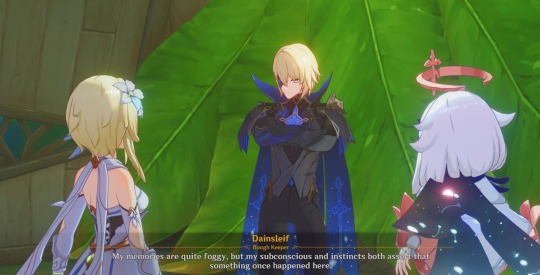
Dainsleif: My memories are quite foggy, but my subconscious and instincts both assert that something once happened here.
Central to Freudian psychoanalysis is the notion that both traumatic and non-traumatic memories and thoughts we experience throughout life, but especially those experienced as children, are forgotten and repressed in the unconscious, censored from the ego's perception. Freud thought that even if we cannot immediately recall these things, they do not simply disappear from the psyche.
The process of repression, which relegates these formerly conscious or “preconscious” thoughts to the unconscious, makes something that was once familiar to us, in this case a thought or belief, feel strange and unfamiliar upon its resurfacing. Freud argued that this is the true nature of the uncanny. It is why uncanny feelings are characterized by dread and anxiety - because the object or story or phenomenon triggering the memory's resurfacing reminds us of something we once knew intimately, but that has become unfamiliar through repression and distortion.

Alhaitham: However, these memories aren’t truly lost, but merely sealed away. They can be restored with the appropriate stimulus.
The uncanny, then, is characterized by a return of the repressed, a recursion or repetition if you will. This was quite long-winded, but the most important takeaway here is that the boundary between the uncanny and the familiar, the unheimlich and heimlich, would seem impermeable on the surface but is in fact fluid and changeable. With time, things that were once familiar and pleasant can become strange and unsettling.
An example might help here. Let’s take a line from A Drunkard’s Tale, an in-game fictional book (credits to Tuna for this example, which I would not have thought to analyze with the uncanny without having read their observation thread on Caribert):
“What you humans call wine, we wolves call the Abyss.”
There is a sentence in Freud’s essay that has a very similar structure to this one, printed here:
“We call it unheimlich; you call it heimlich” (Freud, 3)
Or, to more closely mirror the structure of the quote from A Drunkard’s Tale:
“You call it heimlich; we call it unheimlich.”
So, let’s break this up and analyze it in parts:
“What you humans call wine/You call it heimlich.” Wine is a “known” thing, it is a product from an ordered world with rules. We know how it’s made and what effects it has when consumed. It “belongs to the home,” the “home” being an abstraction of all that is familiar.
“We wolves call the Abyss/we call it unheimlich.” Unheimlich is something strange and unfamiliar, a feeling of dread, but it is synonymous with the second meaning of heimlich, a word most commonly denoting what is familiar. The Abyss is "beyond this world," it is everything that exists outside of the boundaries of “Teyvat.” So how can the Abyss even be compared to wine? Maybe because there isn’t as big of a difference between them as we would initially think. The quote is asking this question: how can the Abyss be something beyond this world/outside of it (unheimlich) when it’s right here in your very human/Teyvat things (heimlich)?
Or, if you’ve ever experienced the sensation of déjà vu, that’s also an uncanny feeling. Speaking of déjà vu…
Recursion, Repetition, Samsara
“We think we are creating the system for our own purposes. We believe we are making it in our own image... But the computer is not really like us. It is a projection of a very slim part of ourselves: that portion devoted to logic, order, rule, and clarity.” -Ellen Ullman, Close to the Machine: Technophilia and its Discontents
One of the many machines we became acquainted with in the Sumeru Archon Quest was the Akasha. The Akasha was advertised as an access point to knowledge from Irminsul, but in reality it was a dream-harvesting machine unevenly distributing “bundles of human wisdom” to the terminal-wearing Sumeru populace in exchange for their dreamless sleep.
We know how the story goes: Nahida leads us to the truth of the samsara in Act II by having us make associations about our strange environment ourselves - a process that takes inspiration from Freud’s method for dream interpretation, free association (more on that here). She does this because delivering the truth to us without having made these connections ourselves would “blow our minds,” permanently confusing our sense of reality and dream. Basically, she has us do the opposite of repression - we take information from our strange environment, associate it with things we are familiar with, and arrive at the answers on our own. This exercise helps us understand the hidden truth of the Akasha, a secret concealed by the Akademiya’s sages.
To take our understanding of this a step further and connect it to another angle of the uncanny, I want to turn our attention back to the first meaning of heimlich, specifically how it describes things “belonging to the home.” Another English word for this would be domestic, things pertaining to the house and running the household. Familiar things. All other things outside of the house, like the wilderness, the foreign, would be unheimlich. As we’ve established earlier, the line between these two categories is changeable. Things previously regarded as domestic, belonging to the home, can become unfamiliar with time.
There is a lot we can do with this, but let’s focus on its applications to the Akasha first. Aranaga actually takes a very similar approach when explaining its function in Agnihotra Sutra:
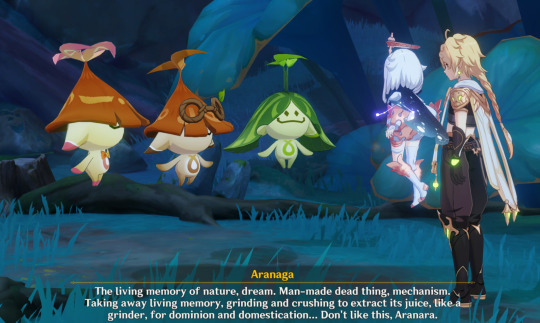
Aranaga: Here, Aranaga's remembrance, is this flower. Cannot blow him away, the Ad Oblivione; cannot destroy him, the device that takes away dreams.
Traveler: The thing that takes away dreams...?
Aranaga: The living memory of nature, dream. Man-made dead thing, mechanism. Taking away living memory, grinding and crushing to extract its juice, like a grinder, for dominion and domestication... Don't like this, Aranara.
Paimon: Eh... Why?
Aranaga: Because the garden of freedom, the source of power, dreams and memories, not only for Aranara, but also for Nara. But Nara don't know. Not good action... extraction, grinding.
Aranaga: Memories and dreams are gone, reason for action is gone, strength is also gone.
Domestication is the process by which things “outside of the home” are brought “inside.” In human history, we can observe this process through the domestication of crops, livestock animals, dogs, and so on. What was once wild and outside the realm of human control is tamed and cultivated within the boundaries of the city center. Domestication has a greater purpose: to extend civilization’s power and control over what is “outside” by controlling its reproduction.
It’s an apt description for the Akasha under the control of the previous sages - it was a Dream Domestication Machine, bringing a “source of power” within the Akademiya’s control in order to populate the Akasha’s records with knowledge. Eventually, it would also be used to attempt to create their own mechanical God, in hopes of bringing a sliver of divinity within human control. In essence, the sages made the strange (dreams) into the familiar (a power source). Domestication, then, is the inversion of repression and the uncanny.
We can see this in the Akasha’s predictive capabilities as well. Given enough information, the Akasha can use behavioral logic to predict (though not dictate) the movements of a person, but only to a certain point. Its ideal subject was someone like Cyno before the Archon Quest - a “decisive and principled person,” someone who prefers to operate independently of other people and their behavioral logic, which can muddy and change our own. Cyno’s behavior was once predictable and familiar to the Akasha’s algorithms, but by changing his behavior he became unreadable, unfamiliar, and strange, if temporarily.
“A Flower Not Of This World”
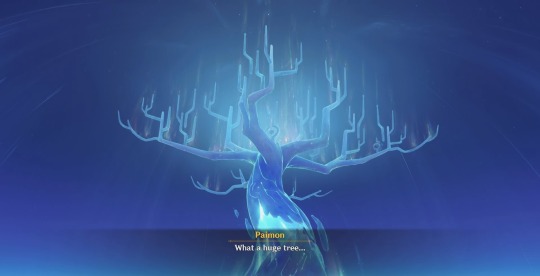
Considering the Akasha was made by the Dendro archon, whose origins lie in Irminsul, and the copious foreshadowing in Act II’s samsara for the resolution of Inversion of Genesis, it is not outlandish to view the Akasha as an analog to Irminsul. Though they may not function exactly the same way, we can already observe that Irminsul behaves more like a machine than something biological, what with Nahida functioning as a sort of system administrator to it (with limited privileges, it would seem…), its use of system permissions, its virus vulnerability (forbidden knowledge), its strictly literal interpretation of commands executed to its database...you get the picture.
So what is the purpose of this arboreal machine? And what are the rules?
While the intimate details of Irminsul are still murky, including who all can control it and who made it, we do know a few important things about it:
It contains a record of everything that has happened in Teyvat in the form of collective memories. It acquires memories through the Ley Line network, which stretches all over Teyvat, and records information as it happens. It also seems to acquire the memories of those who pass away - it is repeatedly stated in Aranyaka that everyone “returns to Sarva” when they pass.
It can alter memories of the past when edits are made to its database. We have two known instances of this so far, both of which are deletions: the removal of the memory of Rukkhadevata, and the removal of the identities “Kabukimono” and “Balladeer.”
The Traveler's memories are not affected by edits to Irminsul because they are not of this world. This is because of the truth hidden by Irminsul’s records - it contains no records of “descenders,” because to do so would be to admit that the sky is fake.
Deleted memories are not lost forever if necessary precautions are taken. While non-fiction books, quest dialogue, domain descriptions, and other quest items are altered by Irminsul edits, fiction is outside of its reach. Nahida understood this intimately, so she hid the true history of the Wanderer in a fairy tale story, which was her own unique form of distortion independent of Irminsul’s distortion. This allowed her to freely associate the elements of the fairy tale back to the truth, just like what we did in Act II to arrive at the truth of the samsara, and just like what Freud had his patients do to interpret their dreams. Through this, she resurfaced her memory of the truth.
Returning to the idea of the uncanny and the familiar, what happens when we think of Teyvat as a “home,” and everything considered separate from it (like descenders, the abyss, or forbidden knowledge) is the uncanny, outside of this world? The utility of Irminsul becomes clear: it delineates the boundaries of “Teyvat” so as to maintain a closed system of memory production in its inhabitants.
Another way to look at Irminsul, then, is as a Memory Domestication Machine. This analogy requires us to stretch the definition of domestication as not only involving something under human control, but it still functions the same way.
It’s important that we understand the rules of this machine and familiarize ourselves with its boundaries - only then can we understand its limitations and exploit them:
Alhaitham: You may find it hard to believe, but for those people, everything the Akasha transmits to them is nothing short of absolute truth.
Alhaitham: Imagine if you've been using a device like the Akasha since the day you were born. And this device has always supported you during times of need...
Alhaitham: After all that time, what do you think you'd become?
Paimon: Uh... A fool? A machine?
Alhaitham: A slave to orders. And that's why rules are so important. In addition, those who understand the rules can delineate boundaries, and identify gray areas.
Paimon: Hmm... but why would you need to identify the gray areas?
Alhaitham: You could say that those kinds of ambiguous zones can be very interesting. One might even say they're advantageous in the right hands…
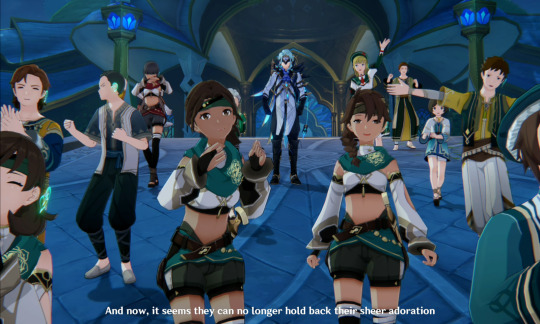
Dottore: And now, it seems they can no longer hold back their sheer adoration..
Under the dominion of the Akasha, the line between human and machine was blurred. The same can be said for Irminsul – even alterations to its records produce the same fates with different recollected details, further calling into question the notion of free will under Teyvat’s laws. In the real world, we use the Turing test to measure a machine's ability to imitate a human, but the Akasha and Irminsul turn this idea on its head - are humans, in fact, the machines here?
If free will is an illusion, then one perspective might posit that human lives in Teyvat are no better than programs running to completion. It’s part of the irony that the remnants of Khaenri’ah’s technology are humanoid automatons (“Machines of war built in man’s image”). Whether or not that perspective is correct is for you to decide.
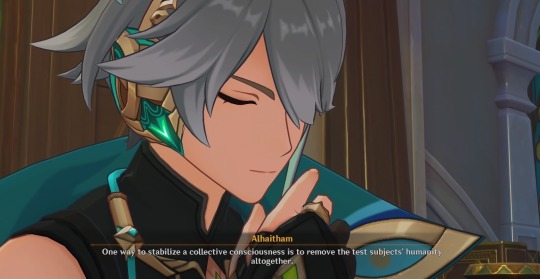
Alhaitham: One way to stabilize a collective consciousness is to remove the test subjects’ humanity altogether.
(look, I’m not saying Irminsul is a machine with an Overmind using it to create a collective unconscious, but that is also what I am saying).
Although it can change how the past is remembered, Irminsul has to abide by fate. Considering that the Akasha had predictive capabilities and is an analog to Irminsul, we might be tempted to ascribe predictive capabilities to Irminsul as well. It’s not outside of the realm of possibility. But, I think what is more likely at this stage is that Irminsul and the Ley Lines are just parts of a greater system of machines delineating Teyvat's boundaries, and one of those machines has dominion over fate.
One last piece of information we gained from the Sumeru Archon Quest was that the Traveler’s sibling is recorded in Irminsul. The Wanderer states that “[the sibling] only came to this world because the heavens responded to the summoning,” that Khaenri’ah was their first destination upon arriving sometime before the Cataclysm, and after which they traveled the Seven nations before their fate became “deliberately obfuscated” by “someone.” Now, they are running the Abyss Order.
At the end of "Akasha Pulses, the Kalpa Flame Rises," Nahida told us this:
Nahida: There's only one possible explanation: [they] belong to this world.”
But Nahida’s wording here is very important. It reminds me of Sucrose’s philosophizing about the prophecy Collei found in this year's Windblume:
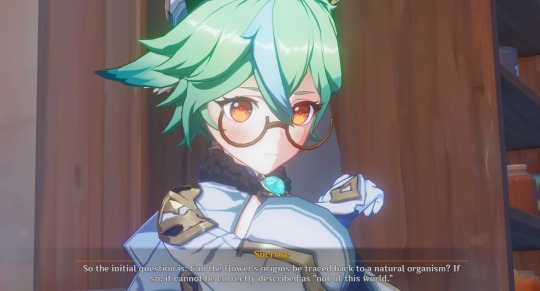
Sucrose: I was thinking about the flower that is "not of this world." It could mean a human-cultivated variety that doesn't occur in nature... But that's basically claiming that it doesn't come from this world in the first place, when actually it's just a variant of an existing breed.
Sucrose: So the initial question is: Can the flower's origins be traced back to a natural organism? If so, it cannot be correctly described as "not of this world."
Sucrose: But then... supposing we identified something outside of that category, whose job would it be to decide whether it belongs in this world or not? Then the question becomes: Do "of this world" and "from this world" mean the same thing... or is it deeper than that?
The heimlich and unheimlich are divided by a permeable, fluid boundary. While there is absolutely still room for more plot twists regarding the Abyss Sibling’s origins, for now I think the additional information we have about their arrival to Teyvat simultaneously contradicts and supports Nahida’s initial hypothesis. The Abyss Sibling may indeed not be from Teyvat, just like the Traveler, but that does not preclude them from being brought into the boundaries of Teyvat through an unknown method of tampering with Irminsul, so that they now belong to Teyvat and are “of this world.” I mean to suggest that the Abyss Sibling was domesticated into Irminsul’s memory, and therefore into the boundaries that delineate Teyvat. How exactly, by who, and for what exact purpose is currently unclear. But if I were to guess….
The Uncanny and the Abyss
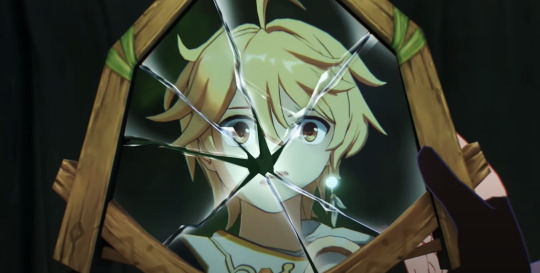
Chlothar: To us, you were the Abyss…a wondrous mystery far beyond our imagination and comprehension…and the one who controls the Abyss can control everything!
So like…we need to talk about Caribert.
In Chlothar’s despair at having failed to recover Caribert’s consciousness, the Abyss called out to him and opened a strange domain near Sumeru’s entrance to the Chasm. Once there, he and the Abyss Sibling discover a mysterious hanging crystal which whispers about a power the bowing Hilichurls and Chlothar covet. This power, which Chlothar understands as the Abyss, does indeed resurface Caribert’s consciousness, but it comes with a price. Chlothar’s obsession with the crystal steers his attention away from his son, who in child-like wonder gazed upon his maskless reflection in a hand mirror, only to discover the horror of reality: this is not a fairytale world like his father said, he has really become a Hilichurl, his home has been obliterated, and there is no going back to life as he once knew it.
So, he rejects his fate and removes his mask one final time, unleashing a dark power that engulfs his body. Though the player passes out at this moment, Chlothar later says something cryptic regarding his son, who has now vanished from sight:
Chlothar: You saw it too, didn't you? Unmistakable... The power inside Caribert and the power of the one you call a "Sinner," it was one and the same...
Chlothar: I am positive now... it's the power of the Abyss, isn't it?
Chlothar: At long last, I have seen it with my own eyes...
Traveler: I didn't see clearly...
Traveler: What happened to Caribert?
Chlothar: That is no business of yours!
Chlothar: A sinner... Yes, salvation for a sinner can only come from a sinner...
Chlothar: Caribert did not deserve his fate, but now... It's wonderful — he will be able to weave his own destiny anew.
Chlothar: Born into abject sorrow, he shall now become... "The Loom of Fate."
There is a LOT in this dialogue to unpack. First, let’s talk about what happened to Caribert. Though we do not see it ourselves, Chlothar says “salvation for a sinner can only come from a sinner,” and that now Caribert can weave his own destiny anew. He also states that he has never seen the power of the Abyss before now, but I also wonder if he is saying he has never seen the Loom of Fate’s power with his own eyes before. To me, this suggests that Caribert fused with the Abyss, or even with the Loom of Fate (assuming these two are separate things to begin with).

Then, Chlothar says more strange things about the Abyss Sibling:
Chlothar: ...Sinister? ...Dangerous?
Chlothar: I never imagined that you, of all people, would deny the Abyss... How ridiculous!
Chlothar: We once believed that you would bring new strength and hope to Khaenri'ah.
Chlothar: To us, you were the Abyss... A wondrous mystery far beyond our imagination and comprehension...
Chlothar: ...And the one who controls the Abyss can control everything!
Chlothar: We yearned for that future. We looked to you to take us there.
Chlothar: But what did you bring us instead?
Chlothar: O Prince... of Khaenri'ah?
Remember how in Inversion of Genesis, Wanderer told us that the only reason that the sibling was able to come to Teyvat was because “the heavens responded to the summoning?”, and the Traveler immediately suspected that Khaenri’ah had to do with the sibling’s appearance in Irminsul’s records? Yeah, well. I'm not exactly saying they summoned the twins, but they clearly were up to no good once they encountered the sibling.
“To us, you were the Abyss.” The Twins are external to the laws of Teyvat, making them unknown, strange, and unfamiliar to this world. Chlothar’s dialogue suggests to me that Khaenri’ah has been seeking a power from beyond for a long time now. My speculation is that Khaenri’ah has known for a while about this “Loom of Fate,” but could never prove its existence. The Loom of Fate is likely what materializes fate into reality, if it does not also dictate fate, and it seems to be located in the Abyss itself. A loom is a wooden machine of sorts, used to hold thread or yarn taut as the user weaves them into cloth or tapestries. This is the machine I suspect Irminsul is working with as a system. Whether the Loom of Fate is a “Fate Domesticating Machine” is unknowable for now, but surely we can conclude that the Loom of Fate Operation is a fate domesticating mission. Perhaps they sought to control the Loom of Fate through the sibling. Perhaps they hoped to do so in order to change their own fate, as ignorant beings ruled by a cruel order imposed by the heavens above.
One final, somewhat tangential remark I’d like to make is about the name of the Hilichurl curse, the “curse of the wilderness.” This again gestures toward the idea of a home place and a wild place, what belongs to the home and what is outside of it. Something tells me from the last quest with Dainsleif in the Chasm that Hilichurls do not go to Sarva when they die, they disintegrate into the dark mud of forbidden knowledge. The curse casts them “outside” of the cycle of life and death, outside of the memory production system, and outside of fate. Though they are still from this world, in a sense they no longer belong to it either.
A Companion Machine Manifesto?

Faruzan: As for me…I want to stay with Tamimi for a bit longer. Just a bit.
I don’t want to get too into it now since this post is already too long, but it would be normal to wonder after all of this what to do with these boundaries at the center of Genshin’s world structure and conflict. We can’t just get rid of them all – King Deshret already tried that, and it didn’t work out so well for him. For now, when I think of the answer to this question, I can’t help but think of Karkata, Benben, and Tamimi, and their unique relationships to humans.
To be honest, they are what originally got me thinking about domestication as a way of reading Genshin’s worldbuilding. They participate in mutualistic relationships with the humans around them, living together in what feminist scholar Donna Haraway calls a relationship of “significant otherness.” As automatons that belong to lines of machines designed for war, their difference seems significant. I don’t have the precise language for this yet, but when I think of these care-full relationships they share with Tighnari, Jeht, and Faruzan, I can’t help but feel hopeful that things can change.
If you’ve made it this far, I truly from the bottom of my heart thank you so much for reading <3 Until next time!
External Sources/Further Reading
Das Unheimliche by Sigmund Freud, translated by Alix Strachey.
Against the Grain: A Deep History of the Earliest States by James C. Scott.
The Companion Species Manifesto: Dogs, People, and Significant Otherness by Donna Haraway.
“The Uncanny Familiar: Can We Ever Really Know a Cat?” by David Wood (this is amazing btw).
…Okay but the wild part is this is the second post I’ve made about the uncanny since this idea was born in September and I STILL HAVEN’T WRITTEN THE POST I WANT TO WRITE YET. When I get back from my thesis hiatus, we are talking about the ‘bots. And I mean ALL of them. And Dottore. And the Golden Slumber!!
edit 6.16.23: cleaned the post up! edited sentences for clarity, added to some unfinished thoughts, and re-formatted a few things that got lost between gdocs and tumblr. also grammar is hard :[
#genshin impact#genshin lore#genshin impact lore#genshin meta#caribert#chlothar alberich#dainsleif#irminsul#loom of fate#faruzan#theory#I will stop writing about machines when the sun explodes
234 notes
·
View notes
Text
silly hc that whenever people remember things done by scaramouche their brain has a little catch up moment of 'huh what'
e.g. if one of the harbingers is thinking about something that scara had done theyll be like 'oh the sixth did that. hold on a second who the fuck is the sixth?? it was (insert whoever irminsul decided to patch the blank with)'
but the person that irminsul patches the blank with wont have any memories of having done that thing. it will be blank, there will be no time slot in their memory for that action. but its a fact that everybody knows. they did that thing.
it gets even fuckier when its people whos lives have been severely impacted by scaramouche. like how does a scara-less dotorre manage to make his clones?? how is irminsul patching an entire person missing that made niwa, katsuragi and nagamasa work together and form a stronger bond?? is dotorre just missing 300-400 years of experimenting on the same person?? does irminsul patch it with 'oh yeah you were just like helping the akademia make a god' but dottore wouldnt have had a reason to work with the akademia without already having experimented on scara. dottore hated the akademia at that point, why would he work with them?? do the people murdered by kunikuzushi remember only seeing a mysterious figure kill them?? does that child remember a person taking care of them in the months-weeks-days leading up to their death?? does the tsaritsa ever wonder why she has allowed the sixth seat to stay empty even though she has taken in new harbingers??
irminsul really is working in overdriving to fill in all the patches that an entire person not existing anymore creates
#genshin impact#genshin#scaramouche#irminsul#got a bit rambly oops#hc#scara hc#might write something about this actually#still unsure#i have coursework and other fics to work on
21 notes
·
View notes
Text
I wonder if the whole Abyss and Forbidden Knowledge thing is a metaphor for Gödel's incompleteness theorems.
It's not that farfetched, the second theorem was popularized in non-academic circles (to the point where even mentioning it in academic discussions is now a faux pas unless it's among mathematicians) and was used to point at the core difference between human and AI thinking (until the current generation of AI models fell outside of what it describes).
And Genshin does have a lot of AI themes.
Bear with me for a second.
In layman terms, in a system like formal logic there are statements we can express using this system and ones we can prove or disprove.
And if the system is consistent (doesn't hold contradicting statements) these are different things! You can say things that will be true and will correctly describe the object you are trying to describe but there will be no way to logically derive them from the other statements you already have.
Also a consistent system can't prove that it's consistent.
(an inconsistent, contradictory system has no such problems.
you can also formally accept a non-provable statement into a consistent system as another axiom/"known truth" and it will create a new system with new properties)
These theorems were formulated as a way to talk about the limitations of mathematics compared to our thinking, but in popular reading they somehow turned into "for any formal system there's a statement that nukes it" (Gödel statement).
Some people wondered if a Gödel statement that fries a person's brain is possible.
What I currently see in Genshin painfully resembles those popular readings.
Celestially maintained Teyvat laws are a consistent system, forbidden knowledge is a statement that can be neither proven nor disproven in that system (and messes it up), Abyss is an inconsistent system (any statement can be proven true and it's pretty horrible but also hey, anything can be proven true so forbidden knowledge doesn't disrupt it further).
Perhaps gods and their ideas are something like logical statements and owning a gnosis symbolises incorporating their "truth" into the overarching formal system of Teyvat laws.
(perhaps different cycles are just variations of the same world with slightly different rules/axioms)
Also Irminsul cannot be allowed to think of things it can't understand and it cannot be allowed to think of its nature and consistency of the information it stores.
#when in doubt resort to foundations of mathematics#also if I have mathematicians here please forgive me#I know I grossly oversimplified it#but I can't talk about peano's axiomatics in a fandom tumblr#people might die of fun#and it's about the popular reading anyway#genshin lore#genshin lore tumour#irminsul
23 notes
·
View notes
Text
Rukkhadevata and Barbatos were Irminsul protectors-bros theory
(Sumeru and Barbatos connections part 1)
The more lore we get, the more connection I see between Sumeru, Dendro archon, memories, Irminsul, hexenzirkel and Barbatos (you are everywhere dude you are so sus i just can’t). And I just want to share with my thoughts, so welcome to my Genshin TED talks or whatever.
Long story short, I believe that Rukkhadevata ( I will use Rukkha after) and Barbatos were really good friends and they protected Irminsul and memories of Teyvat together.
Firstly: Venti voice over about Buer.
“The first thing you think of when you hear “Dendro archon” is her power over dreams. Her dreams are akin to my ballads: full of emotions and imagination. It goes without saying that we get along really well.”
Since Nahida and Venti haven’t met yet canonically, I presume that he is talking about his relationships with Dendro archon in the past, before the cataclysm. And I believe by “Dendro archon” he means specifically Greater Lord Rukkhadevata ( he remembers her for sure I just know it okay).
Secondly: Rukkha and Barbatos have pretty much in common.
They are people who value emotions and creativity and they also are responsible for “defending” memories.
Rukkha is the avatar of Irminsul ( and Irminsul is a “sacred pillar” which is super important in GERMANIC mythology, which is again connected with Mondstadt and Khaenri’ah) and she can find and erase memories and information in Irminsul.
And Venti is a bard - he collects stories/legends and puts people's names in history, so they will be remembered by the world.
In 3.3 we saw that Irminsul can delete information in teyvat, but memories still can be saved with fairytales or any other “poetic/cryptic way”.
And as i can feel - Rukkha is like a giant computer, who collects all of knowledge, information and memories. And Barbatos is someone, who saves this information (or at least part of it) and recalls it in case of emergency. He is like a 1 mln+ GB memory card.
And now, in windblume festival 3.5. We have learned more about hexenzirkel ( The organization which explores Irminsul) and their connection with Barbatos and Mondstadt.
There is NO WAY that Venti is NOT connected wit Rukkhadevata and Irminsul.
#venti#genshin venti#gi venti#genshin#genshin theory#genshin theories#greater lord rukkhadevata#genshin rukkhadevata#dendro archon#anemo archon#barbatos#genshin barbatos#hexenzirkel#genshin 3.5#windblume#lesser lord kusanali#mondstadt#Sumeru#irminsul#lord barbatos
130 notes
·
View notes
Photo

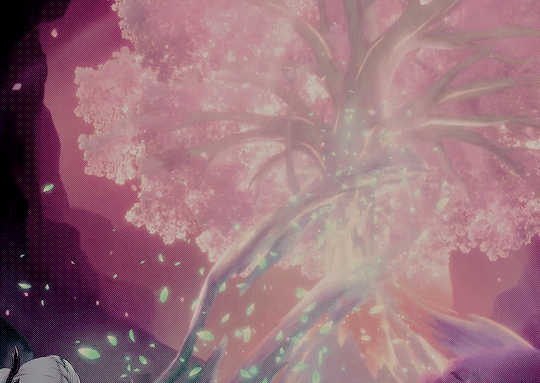
maybe the people have always had a considerate god watching over them
NAHIDA IN THE VER. 3.2 TRAILER: AKASHA PULSES, THE KALPA FLAME RISES
#nahida#lesser lord kusanali#irminsul#genshin impact#ver 3.2#ver 3.2: akasha pulses the kalpa flame rises#dailygenshin#genshinedit#genshinet#dailygaming#gamingedit#gamingnetwork#my edits#clara's edits#mine#my gifs#gif set#genshinnet#videogameedit
273 notes
·
View notes
Text
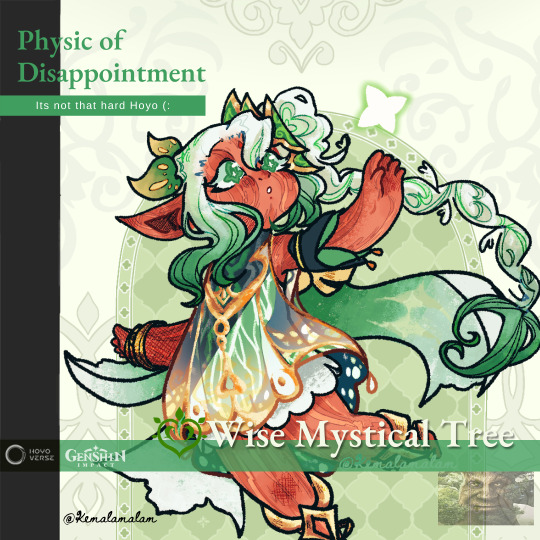

Since Nahida is a branch from Irminsul I think her having tree bark instead of flesh would be cool
I also threw in some snark bc i cant help myself <3

#nahida#lesser lord kusanali#dendro archon#genshin impact#my art#digital art#artists on tumblr#genshin redesign#kusanali redesign#nahida redesign#irminsul#wise mystical tree
281 notes
·
View notes
Text
About the Machines of Khaenri'ah and how they Replicated Living Beings of the Outside World (TL;DR)
To date, I still wonder how Khaenri'ah managed to replicate the physical form and mobility of living beings from Teyvat.

As we know Khaenri'ah didn't have flora nor fauna; so from where they obtained knowledge about other beings outside their nation?
I think there are three hypotheses to this question; I'll go from the one that makes less sense, to the one that makes more sense.
(1) Khaenri'ah had access to Irminsul/ley lines that let them obtain knowledge through it.
We know that Khaenri'ah had no deity (nor they wanted to have one as far as we know), and to date, the only beings we know that have the ability to access Irminsul, are Nahida, and Wanderer.
It seems that the Hexenzirkel was able to make expeditions to Irminsul, probably meaning that they also had access to it.
But there's one exception...the Bough Keeper.
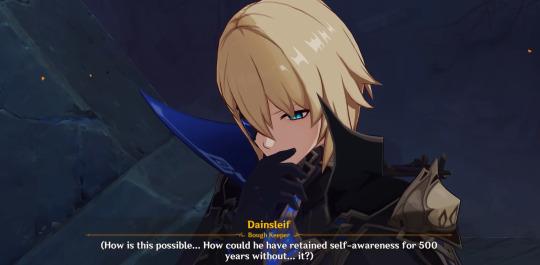
A human with the title of Bough Keeper, a Khaenri'ahn citizen that has retained self-awareness since the destruction of his nation 500 years ago. Technically, he should have lost his self-awareness to date, right? Yet he didn't, and we might have some idea of why this could be.
When Dainsleif met Halfdan in The Chasm, he didn't understand how his fellow comrade still didn't lose his self-awareness without "it"...
Could that "it" be this?
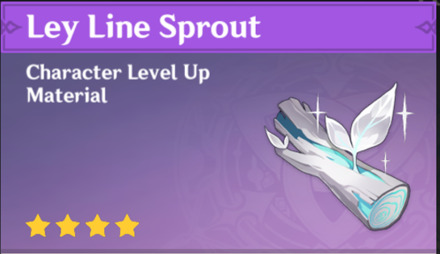
One of the items obtained by defeating Abyss Mages, it's basically a fragment of ley lines. If Dainsleif is in possession of one of these, then maybe the people of Khaenri'ah were also able to use these to learn about the outside world without the necessity of a deity.
Leaving this hypothesis behind, let's start with the next one.
(2) Flora & fauna did exist in Khaenri'ah but became extinct by them
This hypothesis follows something of the actual world we live in.
Some animals have become extinct because of our careless and accelerated expansion; and maybe this also happened to Khaenri'ah, as they were considered a proud & arrogant nation by some.
When their flora & fauna became extinct, they started to use the Art of Khemia to replicate what they used to have, and because they used to have it, they already knew what their flora & fauna used to look like.
Maybe they had art descriptions of them or perhaps they even had actual recordings thanks to their advanced technology. To be honest, I think that this hypothesis is not likely to be true, for these reasons: there are some beings that are very unlikely that used to be in Khaenri'ah.

One example is the Setekh Wenut & the Ruin Serpent which look very alike to it. The Setekh Wenut seems to be from a long time ago because the description of its drop item shows that the Setekh Wenut existed long before time even existed.
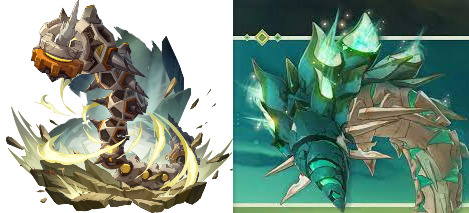
This is the drop item: Pseudo-Stamens.

Hypostasis also are also kinda likely to not have been in Khaenri'ah as far as we know, yet these people still managed to replicate a machine like them: the Perpetual Mechanical Array.
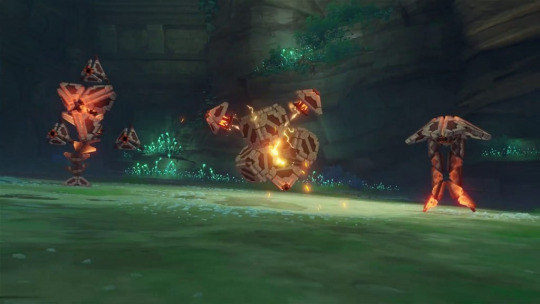
Going to the next & last hypothesis...
(3) Khaenri'ah sent people to Teyvat to learn more about the living beings there.
In the book Sun & Moon we were taught that while Khaenri'ah still existed, they sent people to Enkanomiya to get the book.
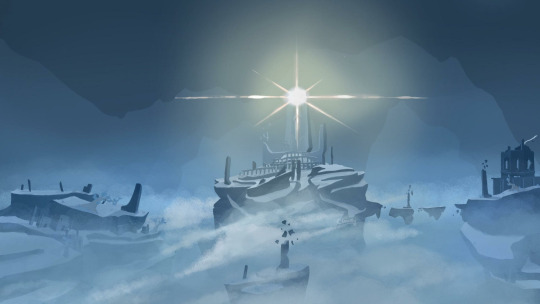
It seems that when these people of Khaenri'ah were sent to Enkanomiya, they also bring all kinds of ruin machines with them This could mean that Khaenri'ah had the resources and capacity to travel to other parts of Teyvat.
Maybe non of these hypotheses are accurate, but I really hope they are near to the truth we still yet need to know.
#genshin#genshn impact#enkanomiya#khaenriah#khaenri'ah#machines#wenut#abyss#dainsleif#abyss order#teyvat#ruin serpent#ruin guards#irminsul#hexenzirkel#wanderer#nahida#zhongli#venti#ei#raiden shogun#traveler#ley lines#halfdan#bough keeper#Perpetual Mechanical Array#celestia#sumeru#mondstad#liyue
132 notes
·
View notes
Photo
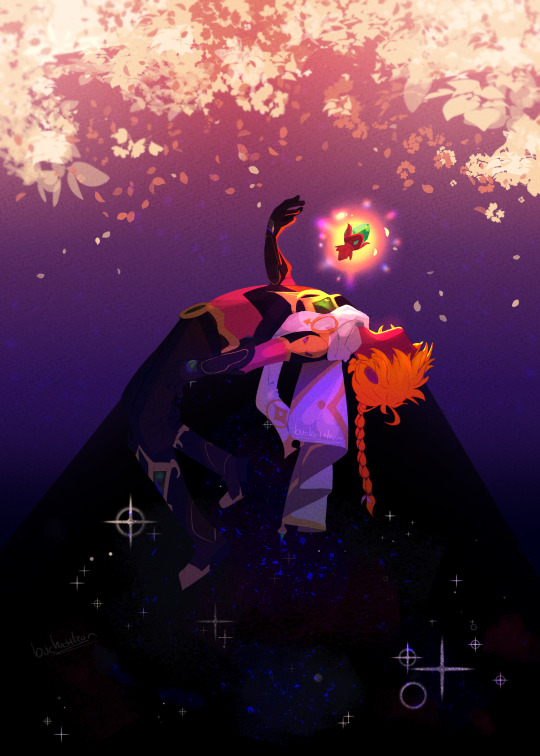
keeper of the records the tree could not erase.
alt colouring under cut.

#genshin impact#sumeru#aether#greater lord rukkhadevata#artists on tumblr#genshin impact fanart#3.2 archon quest#irminsul#beck scribs
187 notes
·
View notes
Text

our paths have crossed in the past, will i ever see you again [deleted]?
#genshin impact#genshin fanart#dottoscara#dottore#scaramouche#scarattore#wanderer#irminsul#my art#fanart
57 notes
·
View notes